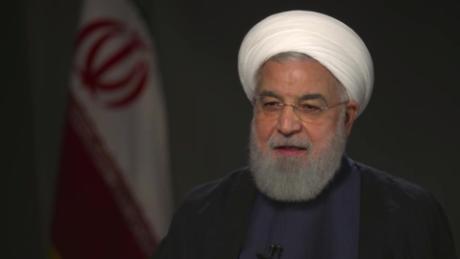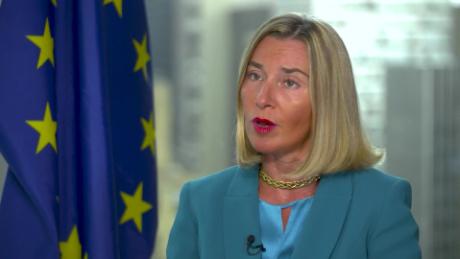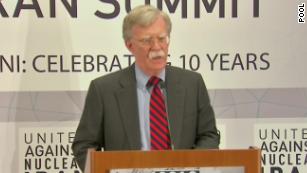Iran can afford to play a waiting game with Donald Trump
Not long after the rest of the world had openly laughed at his boss as he addressed the United Nations General Assembly, US National Security Advisor John Bolton mustered his best Jacobean menace on Tuesday.
"According to the mullahs in Tehran, we are 'the Great Satan,' lord of the underworld, master of the raging inferno," he said on the margins of the UNGA Tuesday.
"So, I might imagine they would take me seriously when I assure them today: If you cross us, our allies, or our partners; if you harm our citizens; if you continue to lie, cheat, and deceive, yes, there will indeed be HELL to PAY."
Those are his block capitals and this is his preferred fire-breathing role.
But where is US policy on Iran?
Consider that at the same time as Bolton was breathing fire, President Trump was tweeting -- albeit to pre-emptively reject an Iranian invitation to meet that was apparently never made -- that he is sure Iranian President Hassan Rouhani "is an absolutely lovely man!"
Bolton warns Iran that US 'will come after you'
In truth, US policy on Iran is not devastatingly complicated.
Trump, the ultimate dealmaker, thinks he can continue to squeeze Iran with the slow choke of sanctions, holding out the option of a one-on-one, Art of the All-Encompassing Deal meeting between himself and President Rouhani.
He believes that Secretary of State Mike Pompeo's wish list of 12 ways in which Iran needs to change, coupled with block-capital threats, will eventually see Tehran's influence diminished in the Middle East.
But this is a policy perhaps too simple to meet the challenge. The nuclear deal stemmed from the calculus that the US couldn't really afford a third war in that region. Therefore, tackling the concern of Iran's nuclear program with a separate deal was the best bet. Empower moderates by permitting a little globalization and reform in Iran and it may soften by itself, or so went the Obama administration's thinking.
None of this calculus has changed. And barring some madcap escalation or Iranian rush to enrichment, Pentagon chief James Mattis and Secretary of State Mike Pompeo are likely to keep cool enough heads to prevent any sudden direct US military action.
What has changed, however, is the credibility of the US. Foreign policy is for Trump a distraction that he appears to dip in and out of when his domestic crises mount.

Iran leader responds to Trump's 'lovely man' tweet
It's where the bluster of the showman is at its most terrifying, as lives and military action are in the balance. But if you were in Tehran observing Trump's bipolar and largely ineffective attitude towards North Korea -- which actually has nukes that might one day hit the United States -- it would be tempting to sit, wait and do nothing.
This appears to be the tacit approach of Iranian officials, who see a White House that is struggling to explain its President's Twitter account as the Russia investigation swirls.
Why make a deal with hardliners who may not be around for long -- and are certainly distracted while they are in the White House? The Iranian position remains that the old deal stands, is backed by a UN resolution and is the unassailable rock from which any other talks stem.
The White House's bluster and unilateralism may have conjured the worst of all worlds.
First, the Iranian moderates who signed the deal now risk ceding internal ground to hardliners. Witness the recent appearance of President Rouhani in the cockpit of Iran's first domestically-produced jet fighter.
Second, Iran continues to consolidate its position in Syria, cementing military partnerships with the Assad regime. The Pentagon can only respond by staying around in Northern Syria -- by doing more of the same, rather than leaving months down the line.
Third, the European allies (and Russia) -- whose unity under the Obama administration made the deal so effective -- are going their own way.

Mogherini: Is war the alternative to Iran diplomacy? 10:04
Indeed, they are striving to create a "Special Purpose Vehicle" to insulate European companies that want to trade with Iran from being hit by US retaliatory sanctions. It isn't clear how this will work, nor whether any company would still choose risking its access to the US market to retain its hold in the Iranian one.
But the message is politically clear enough: the EU is willing to do unprecedented things to keep the deal alive. Bolton himself conceded that the EU "is strong on rhetoric and weak on follow through," adding truthfully that the "structure ... does not exist yet and has no target date to be created."
But make no mistake, there is a clock fiercely ticking in Tehran. The economy there is in a mess, with the local currency tumbling. While a lot of that is down to internal mismanagement so profound that ministers have lost their jobs, Trump's constant threats to restore sanctions expedited that fall.
The Iranian economy is resilient and has endured years of pressure. But on a recent trip there, I could sense the market trader's fury mount at being unable to pay their rent or know what next week's food prices would be.
So the question remains: who falls first?
Iran's moderate government, undermined by clumsily-renewed sanctions and the failed promise of a nuclear deal? Or the Trump administration, whose domestic scandals rage and mushroom to the point they appear to blur into a daily patina of chaos?
The Iranians have been here before -- a senior official reminding me that Republican hardliners are nothing new to them. Neither are softer approaches from subsequent Democratic US presidents.
Perhaps the fury expressed by Pompeo -- when he noted that his predecessor, John Kerry, had reportedly advised the Iranians just to wait out the Trump administration -- was so acute, because Kerry had a point.
The nuclear deal is technically alive in all but American hearts. Sanctions are biting. But symbolically, Iran has not been abandoned by its European allies and may find ways to persevere.
Iran retains considerable influence in the Middle East, keeping its military hardliners happy enough. And the Trump administration appears to be daily on a survival footing, with its figurehead being openly laughed at by the rest of the world.
News Courtesy: www.cnn.com













